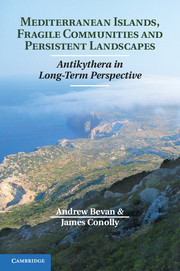 Mediterranean Islands, Fragile Communities and Persistent Landscapes
Mediterranean Islands, Fragile Communities and Persistent Landscapes Book contents
- Frontmatter
- Dedication
- Contents
- Figures and Colour Plates
- Tables
- Acknowledgements
- Abbreviations
- 1 Problems and Perspectives
- 2 Methods and Data
- 3 A Mediterranean and Island Environment
- 4 Material Worlds
- 5 Landscape Archaeology and Historical Ecology I
- 6 Landscape Archaeology and Historical Ecology II
- 7 Mobility and Investment
- 8 The Eccentric, the Specialist and the Displaced
- 9 Antikythera in Context
- Appendix I Statistical and Computational Methods
- Appendix II Locations by Period
- Miscellaneous Endmatter
- Notes
- Bibliography
- Index
8 - The Eccentric, the Specialist and the Displaced
Published online by Cambridge University Press: 05 July 2013
- Frontmatter
- Dedication
- Contents
- Figures and Colour Plates
- Tables
- Acknowledgements
- Abbreviations
- 1 Problems and Perspectives
- 2 Methods and Data
- 3 A Mediterranean and Island Environment
- 4 Material Worlds
- 5 Landscape Archaeology and Historical Ecology I
- 6 Landscape Archaeology and Historical Ecology II
- 7 Mobility and Investment
- 8 The Eccentric, the Specialist and the Displaced
- 9 Antikythera in Context
- Appendix I Statistical and Computational Methods
- Appendix II Locations by Period
- Miscellaneous Endmatter
- Notes
- Bibliography
- Index
Summary
This chapter invokes a range of individual agencies behind life on Antikythera over the full history of its documented exploitation by humans. In particular, we wish to understand — via recent history, ethnography and, where possible, archaeological data — the impact of certain kinds of people whose roles, we would argue, are more central on small islands than they would be otherwise. Such people can arguably be lumped under the three broad headings of the eccentric, the specialist and/or the displaced and include hunters, colonists, cash-croppers, monastics, refugees, pirates, exiles, soldiers, hermits, retirees, modern-day tourists, expatriates and indeed various kinds of academic researcher. This chapter continues to emphasise the variable strategies for human mobility and varying degrees of long-term investment that we raised in the preceding chapter, but also argues that such generic parameters are given their structure by some very specific kinds of human personality and immediate circumstance.
PIRATES
Of all of the aforementioned human activities, it is piracy, hunting and herding that have been some of the most persistent occupational attractors in An-tikythera's history. Antikythera offers an opportunity to reconsider existing models of Mediterranean piracy over the long term, and there are four aspects that we wish to emphasise here: (1) useful distinctions of scale and type in piratical activity; (2) the sociology of pinch-points; (3) the ideology of piracy; and (4) the material culture of pirates.
Information
- Type
- Chapter
- Information
- Mediterranean Islands, Fragile Communities and Persistent LandscapesAntikythera in Long-Term Perspective, pp. 187 - 216Publisher: Cambridge University PressPrint publication year: 2013